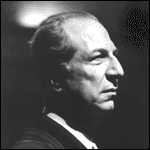 |
 In his ethical thinking, Joseph Sittler gave
attention to both individual and societal issues. The heart of his
ethics is found in his 1957 Rockwell lectures at Rice University, The
Structure of Christian Ethics (reprinted 1998, Westminster John Knox
Press). Jesus Christ stands at the center of Sittler’s ethical vision,
which he calls “biblical ethics.” From Scripture, he fashioned a basic
conviction: “The term engendering is used to assert that the
organic relationship between God and man structured into existence in
creation, incarnated into absolute involvement in redemption, persists
and inwardly determines the realm of sanctification, that is, the field
of Christian ethics” (SCE, 25). Sittler argues that the Bible does
not give us ethical rules or propositions. Jesus rather offers us a
pattern of response to God that is “now here, now there” (51), like
“lightning flashes of God’s love-gift” or “like a gull that suddenly
swoops down and picks up something out of the waters” (50). This
approach has been linked with the “situation ethics” that was widely
encouraged in the 1950s and 1960s. Within this trajectory, Sittler was
emphatic, however, that in every situation it is Jesus Christ who
engenders our action. This approach guided Sittler’s ethics in all
areas, including his writings on the environment and urban church
policy. In his ethical thinking, Joseph Sittler gave
attention to both individual and societal issues. The heart of his
ethics is found in his 1957 Rockwell lectures at Rice University, The
Structure of Christian Ethics (reprinted 1998, Westminster John Knox
Press). Jesus Christ stands at the center of Sittler’s ethical vision,
which he calls “biblical ethics.” From Scripture, he fashioned a basic
conviction: “The term engendering is used to assert that the
organic relationship between God and man structured into existence in
creation, incarnated into absolute involvement in redemption, persists
and inwardly determines the realm of sanctification, that is, the field
of Christian ethics” (SCE, 25). Sittler argues that the Bible does
not give us ethical rules or propositions. Jesus rather offers us a
pattern of response to God that is “now here, now there” (51), like
“lightning flashes of God’s love-gift” or “like a gull that suddenly
swoops down and picks up something out of the waters” (50). This
approach has been linked with the “situation ethics” that was widely
encouraged in the 1950s and 1960s. Within this trajectory, Sittler was
emphatic, however, that in every situation it is Jesus Christ who
engenders our action. This approach guided Sittler’s ethics in all
areas, including his writings on the environment and urban church
policy.
A sample of materials on the Ethics
available from the Archives
-
The Structure of Christian Ethics, with an introduction by
Franklin Sherman. Westminster John Knox Press, 1998, Book
(The material was originally presented by Joseph Sittler as the
Rockwell Lectures at Rice University, Houston, and subsequently
published as The Structure of Christian Ethics by The Louisiana State
University Press, Baton Rouge, 1958.)
-
See also references under
Aging and
Environment/Ecology
|
 |
 |
 |

|
 |